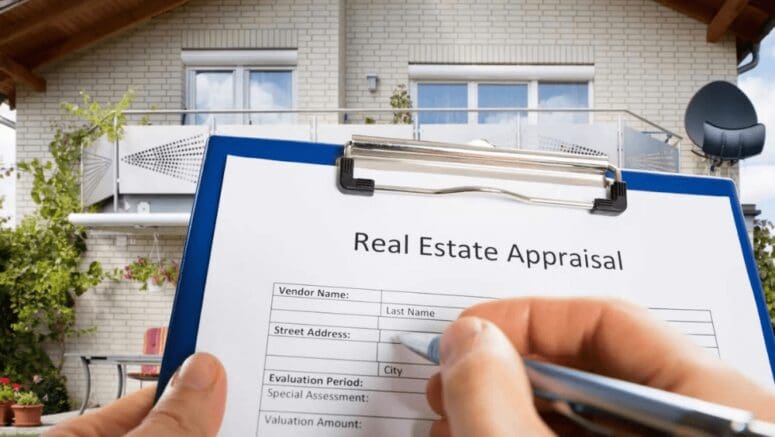What Is a Home Appraisal and How Does It Impact Your Home Sale?
- Published on
- 8 min read
-
 Christine Bartsch, Contributing AuthorClose
Christine Bartsch, Contributing AuthorClose Christine Bartsch Contributing Author
Christine Bartsch Contributing AuthorFormer art and design instructor Christine Bartsch holds an MFA in creative writing from Spalding University. Launching her writing career in 2007, Christine has crafted interior design content for companies including USA Today and Houzz.
-
 Sam Dadofalza, Associate EditorClose
Sam Dadofalza, Associate EditorClose Sam Dadofalza Associate Editor
Sam Dadofalza Associate EditorSam Dadofalza is an associate editor at HomeLight, where she crafts insightful stories to guide homebuyers and sellers through the intricacies of real estate transactions. She has previously contributed to digital marketing firms and online business publications, honing her skills in creating engaging and informative content.
“What’s my home worth?”
That’s the million-dollar question throughout the home sale process. Unfortunately, not everyone will agree on the answer.
Sellers disagree with their agents about the home’s worth when setting a list price. Buyers haggle with sellers over the valuation while negotiating their offer. The buyer’s lender may not agree to the negotiated offer if the appraisal of the property comes back lower than the agreed-upon price.
The worst part? The appraisal happens at the eleventh hour after all parties have invested time, effort, and cold, hard cash into the home sale process.
“The home appraisal is the last part of the loan closing. The lender calls the appraiser on the buyer’s behalf once the house is under contract,” says 22-year veteran agent Peggy Alger in Corpus Christi, Texas. It’s the last thing the lender orders, but it’s a critical step in the process.”
So what is a home appraisal, why is it so important, and just what can a seller do to get the valuation they’re after? Let’s dig into the details.
What is a residential real estate appraisal and why is it important?
If you watch Antiques Roadshow, you’ve already got a pretty good idea what an appraisal is and how it’s done.
An expert on the antique in question evaluates its features, flaws, and condition. Then they determine a price they believe the item is worth based on the facts and their expert opinion.
The home appraisal process essentially works the same way — only the valuation isn’t really for the potential seller of the item; it’s for the buyer and their lender.
The appraisal simply lets the mortgage lender know that the house is worth the amount of money that the buyer wants to borrow in order to buy it.
“An appraisal is for valuation purposes only. It’s an unbiased estimated opinion of the market value of a property for mortgage companies who want to know the value of a property before loaning money,” explains Sylvia Samuels, a highly recommended certified residential real estate appraiser in Corpus Christi, Texas.
“The appraised value is an opinion of market value based on data as well as the appraiser’s on-the-job experience and education. That’s why appraisers are state-regulated and require continuing education to remain licensed or certified.”
The home appraisal is an important part of the mortgage process because the lender wants to know that they’re not lending more than the property is worth. It’s also important to the buyer because it can prevent them from paying too much for the property.
Of course, while appraisals are primarily used as part of a home sale, they are also useful in other situations.
“Appraisals can be used for other purposes, not just purchasing a property,” Samuels says. “They can be used for refinances, home equity loans, estate purposes, and divorce cases. Sellers can also obtain an appraisal to assist in setting an asking price for their property.”
How do home appraisals differ from home inspections?
It seems like home appraisers and inspectors look at the exact same things — and in one regard, they do. Both look at the condition of your home, but an appraiser is concerned with your home’s value, while the inspector is focused solely on its “health.”
“A home appraisal is required by a lender, however, a home inspection is optional. An appraiser is more concerned with the value of a property, and a home inspector is more concerned with the condition of the property,” explains Samuels.
“An appraiser will make note of obvious issues: worn roof, cracks in the walls, and so on. An inspector will check plumbing and electrical systems, foundation, roof, heating and air conditioning, appliances, and attic space, to give the buyer an overall condition of the home.”
Plus, the appraiser’s report is simply an evaluation of the property’s value in its current condition. There are never any recommendations on how to improve the property.
On the other hand, the home inspection report documents a home’s current condition and any issues that could impact a buyer’s health or safety. The inspector helps a buyer make an informed decision about the house they’re purchasing and whether to negotiate repairs before moving forward. A general home inspector may request additional inspections, such as a structural engineer if they feel a significant problem exists.
Who performs the home appraisal and how much do they cost?
Home appraisals are conducted by a qualified residential real estate agent who’s been licensed or certified according to laws and requirements unique to each state.
Since the appraisal matters most to the lender and buyer, the general practice is that the buyer’s mortgage company reaches out to an appraiser that they know is experienced and qualified.
While it is possible for a buyer (or a seller getting a pre-listing appraisal) to find an appraiser on their own, it’s typically the lender who finds the appraiser rather than the buyer. This is because the appraiser needs to be qualified to make a valuation for the specific loan type the buyer is applying for, such as conventional, FHA, VA, or USDA.
An appraiser must be certified to carry out the appraisal for a particular loan transaction. For instance, when a buyer opts for an FHA loan, an FHA appraisal is conducted. If they later choose to refinance their FHA loan into a conventional loan, the mortgage company will arrange for a new appraisal. Most appraisers perform both types of appraisals, so they’re able to convert the initial evaluation, but this conversion comes with a cost.
Don’t stress about any conflict of interest with the mortgage company finding the appraiser for the property. Lenders are prohibited from having direct contact with appraisers related to a specific transaction.
When sellers get a pre-listing appraisal done, they’re the ones who pay for it. But when the appraisal is part of the escrow process, it’s the buyer who pays the appraiser’s fees — whether that appraiser is found by the bank or the buyer.
Appraisers typically charge between $313 and $423 for an appraisal, although the national average is $357.
What does a home appraiser look at?
Basically, the appraiser looks at your house in the same way your buyer did when deciding to buy it. Only you don’t need to worry about keeping your home staged and uncluttered for the appraiser because they don’t care about the look of your furniture, decorating, or your personal items.
Plus, the appraiser isn’t just going to look at the data provided in the MLS listing — especially when it comes to square footage — they’re going to bring their own tape measure.
“An appraiser looks at the general condition of the property and its characteristics, including age, square footage, bedrooms/baths, quality, updating/remodeling, lot size, location, view, and style,” says Samuels.
“County records and other sources may not have the accurate square footage, so the appraisal can determine the property’s living area, which is a large part in determining value.”
The appraiser will also take their own photos of the house for the lender, mainly because their photos won’t have been touched up or altered by a photo editor like the listing photos. This includes pictures of the interior and exterior, as well as close-up photographs of features and flaws.
Images of any neighborhood features that impact your home’s valuation (like nearby train tracks or telephone poles) will be included in the appraisal, too.
Aside from the condition and location of your home, the other big factor appraisers evaluate is the local comps.
In real estate, the term “comps” is short for comparables, and it refers to recently sold homes in your neighborhood that are similar to your own house across a number of key criteria.
Comps provide the appraiser with a dollar range for your home’s “fair market value,” which can then be increased or decreased based on your home’s unique characteristics and features.
“The appraised value depends primarily on the Sales Comparison Approach. This is based on the use of similar properties in the immediate area that have recently sold, known as comparables, or comps,” says Samuels. “Adjustments are made for differences in living area, quality/condition, room count, style, age, location, and site size. So it’s important that the appraiser is familiar with the subject’s immediate neighborhood.”
Why do two appraisals on the same property sometimes come back with different valuations?
Let’s say you got a pre-listing appraisal that valued your house at $500,000. Now the buyer gets one during escrow, but it comes back at $490,000. This can happen for a variety of reasons.
So why do appraisals come back at different evaluations?
Maybe you’ve made new repairs or upgrades to your home in between appraisals — that will always impact the valuation.
Also, appraisers aren’t robots. They’re qualified experts who are also human — so sometimes the variations in valuation can be put own to the fact that people have different opinions.
Appraisals can also differ because different loan types have different criteria for the appraiser to evaluate — but this is the least likely scenario.
“The loan type does not impact a home appraisal,” explains Samuels. “The appraisal is always an estimated opinion of market value. Different loan types may require additional requirements, and different lenders may also have additional requirements, but the final valuation is derived in the same manner.”
But perhaps the most important influence that may alter one appraisal valuation from the next is comparative market analysis or the data-driven report comparing several comps.
If additional homes have sold in your area (for a higher or lower price) since the first appraisal, they’re going to alter the next appraisal valuation.
You see, appraisals have strict guidelines for pulling comps that require them to pull recent sales — typically within the last 90 days. However, if there aren’t enough sales that recent to hit the number of comps they need, they may look back to homes sold within the last 6 to 12 months.
Alternatively (or as well), they may widen the radius for how close in distance the recently sold homes are to yours — which could put those comps in nearby neighborhoods with a lower price bracket.
Plus, appraisers may vary in the number of comps they look at to make their valuation. While three is the minimum number typically required, some appraisers may include four or six comps in their valuation — which could either help or hurt your bottom line.
Comps have such a huge impact on your home’s valuation that they may even cause your agent to recommend postponing your listing for a few weeks.
For example, if your agent notices an almost 6- to 12-month-old comp that sold for significantly lower than you want to list your house for, that’s going to pull your list price and appraisal valuation down.
But if you wait it out a few weeks, that low-value comp will fall outside the standard period that comps are pulled for appraisals — which means that it won’t pull down your valuation.
What should sellers do to prepare for the appraisal and boost your home’s value?
The answer to this question depends on who you ask. Appraisers assess homes in their current state, so if you’re selling a home as is, they won’t typically factor in potential improvements.
The answer to this question depends on who you ask. Since appraisers evaluate houses in their as-is condition, they don’t come from a point of view that considers prepping for or improving the outcome of your appraisal.
“Sellers do not need to do anything to prepare for an appraisal, but it is helpful to have a list of any recent repairs, remodeling, or updating that’s been done,” advises Samuels. “Condition of the property is taken into consideration, so having the property uncluttered, on the interior and exterior, so that the appraiser can view all areas is also helpful.”
However, if you’ve hired a top notch agent, they’ll have a list of things you can do before the appraisal to help increase your home’s value.
“Preparing for the appraisal is important because a seller can do things to help boost their appraisal value,” says Alger.
“Tidying up the yard, mowing, cleaning the exterior, painting the interior, patching any cracks. I also have my clients type up a list of all the upgrades that they’ve done to the home in the last four years, the cost, and the date completed, and just leave that out on the counter where the appraisers can see it.”
What happens if the appraisal comes in low?
It’s every seller’s nightmare when the appraisal comes in low.
If the buyer can’t get a loan for the agreed on purchase price, you’ll either have to agree to sell for a lower price, hope the buyer can afford to pay the difference themselves — or the sale might fall apart completely.
Luckily these aren’t the seller’s only options. If an appraisal comes back low, the seller can appeal the estimated value.
“If an appraisal comes in low, typically the lender will reach out to the agent involved to see if there is any other information concerning the property or any other comparables that may have been overlooked that may affect the value,” explains Samuels.
“The appraiser will review any additional data and determine if it affects the appraisal. If no change in value is made, the seller can reduce the sales price to match the appraisal. If this cannot be negotiated, the buyer can still purchase the property, but they may have to make a larger down payment to make up the difference in the loan amount.”
If all that fails, you can ask the buyer and their lender to order another appraisal.
“It is up to the lender on whether they want to order another appraisal,” says Samuels. “Lending institutions have their own underwriters and reviewers who will determine if they feel another appraisal is necessary. If additional appraisals are done, they are typically paid for by the borrower/buyer — however, that may also be negotiated with the seller.”
Final advice: Appraisals and closing costs
One aspect many sellers forget to consider about the appraisal process is how some special terms negotiated with the buyer can impact the appraisal — specifically the closing costs.
“It’s not always smart to add closing costs on top of sales price because that might impact the appraisal,” advises Alger.
Let’s say the buyer asks the seller to cover $6,000 in closing costs, and the seller agrees, but only if the buyer adds $6,000 to the price of the house. That can sometimes backfire on you because now the house has to appraise for $6,000 more in order for the mortgage company to approve the loan.
Whenever negotiated terms increase the loan amount that the buyer will need above the value of the home, that can result in the mortgage company denying loan approval.
It doesn’t even matter if the buyer qualifies for a $500,000 loan — and your home sale price is only $450,000 even after all extras added on top — the lender may still refuse to lend $450,000 on a house that appraises for $435,000 or less.
Appraisals are a vital part of the home sale process — and the consequences of the appraised valuation can impact your sale in a lot of unexpected ways. So make sure you spend the time and effort to prepare your house for the appraisal and yourself for the outcome.
Header Image Source: (Andrey_Popov/ Shutterstock)








